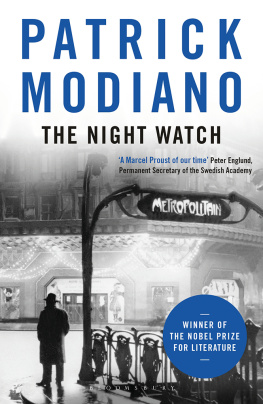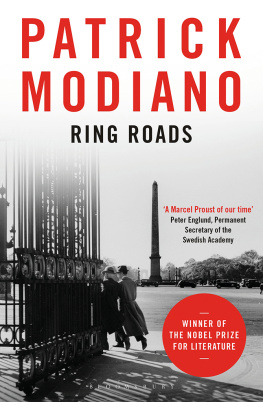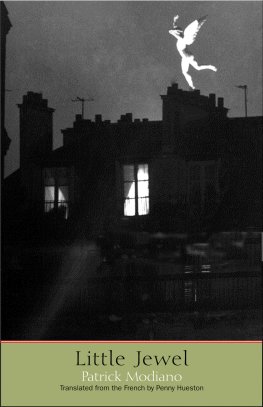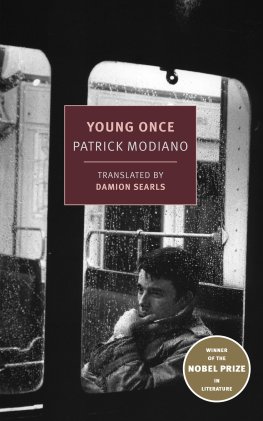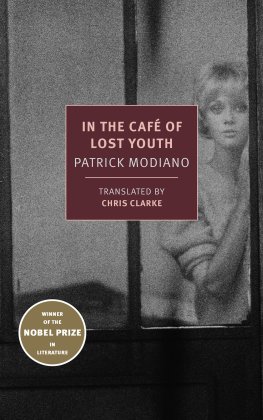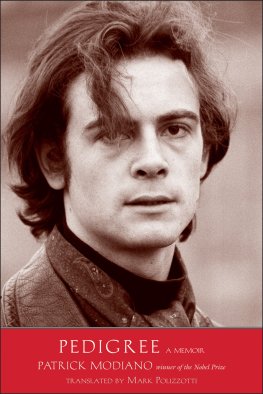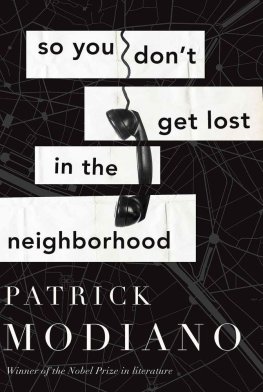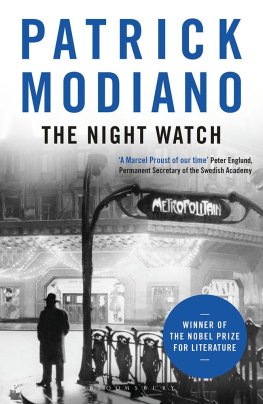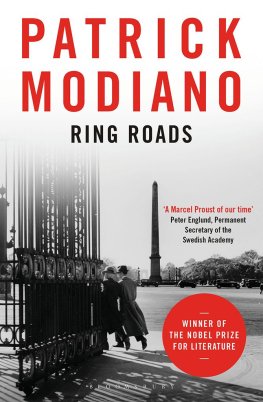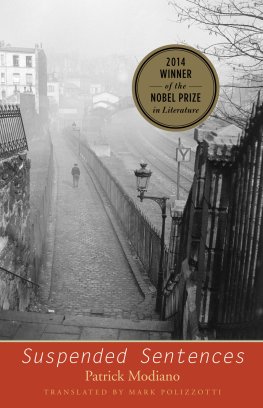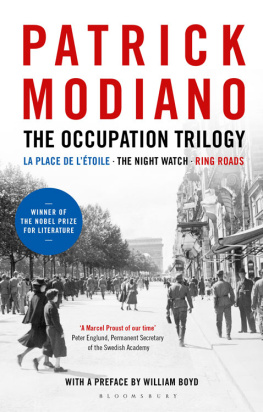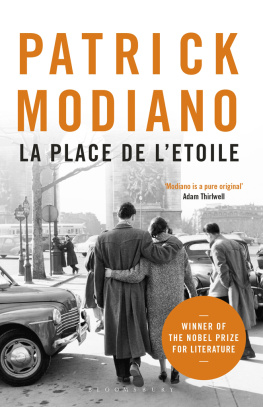A NOTE ON THE AUTHOR
PATRICK MODIANO was born in Paris in 1945 in the immediate aftermath of World War Two and the Nazi occupation of France, a dark period which continues to haunt him. After passing his baccalaurat, he left full-time education and dedicated himself to writing, encouraged by the French writer Raymond Queneau. From his very first book to his most recent, Modiano has pursued a quest for identity and some form of reconciliation with the past. His books have been published in forty languages and among the many prizes they have won are the Grand Prix du Roman de lAcadmie franaise (1972), the Prix Goncourt (1978) and the Austrian State Prize for European Literature (2012). In 2014 he was awarded the Nobel Prize for Literature.
BY THE SAME AUTHOR
La Place de ltoile
Ring Roads

First published in Great Britain by Victor Gollancz in 1972, under the title Night Rounds
This electronic edition published in 2015 by Bloomsbury Publishing Plc
Originally published in France 1969 by ditions Gallimard, Paris, as La Ronde de Nuit
English translation first published in the United States of America by Alfred Knopf in 1971, under the title Night Rounds
English translation by Patricia Wolf in 1971, 1971 by Alfred A. Knopf, a division of Penguin Random House LLC, revised by Frank Wynne in 2015 La ronde de nuit ditions Gallimard, Paris, 1969
The moral right of the author has been asserted
No part of this book may be used or reproduced in any manner whatsoever without written permission from the publisher except in the case of brief quotations embedded in critical articles or reviews
Bloomsbury Publishing Plc
50 Bedford Square
London
WC1B 3DP
www.bloomsbury.com
Bloomsbury is a trademark of Bloomsbury Publishing Plc
Bloomsbury Publishing, London, New Delhi, New York and Sydney
A CIP catalogue record for this book is available from the British Library
eISBN 978-1-4088-6792-1
To find out more about our authors and books visit www.bloomsbury.com. Here you will find extracts, author interviews, details of forthcoming events and the option to sign up for our newsletters.
for Rudy Modiano
for Mother
Why was I identified with the very objects of my horror and compassion?
Scott Fitzgerald
Contents
A burst of laughter in the darkness. The Khedive looked up.
So you played mah-jongg while you waited for us?
And he scatters the ivory tiles across the desk.
Alone? asks Monsieur Philibert.
Have you been waiting for us long, my boy?
Their voices are punctuated by whispers and grave inflections. Monsieur Philibert smiles and gives a vague wave of his hand. The Khedive tilts his head to the left and stands, his cheek almost touching his shoulder. Like a stork.
In the middle of the living room, a grand piano. Purple wallpaper and drapes. Large vases filled with dahlias and orchids. The light from the chandeliers is hazy, as in a bad dream.
How about some music to relax us? suggests Monsieur Philibert.
Sweet music, we need sweet music, announces Lionel de Zieff.
Zwischen heute und morgen? offers Count Baruzzi. Its a fox trot.
Id rather have a tango, says Frau Sultana.
Oh, yes, yes, please, pleads Baroness Lydia Stahl.
Du, du gehst an mir vorbei, Violette Morris murmurs plaintively.
The Khedive cuts it short: Make it Zwischen heute und morgen.
The women have too much make-up. The men are dressed in garish colours. Lionel de Zieff is wearing an orange suit and an ochre-striped shirt. Pols de Helder a yellow jacket and sky-blue trousers, Count Baruzzi a dusty-green tuxedo. Several couples start to dance. Costachesco with Jean-Farouk de Mthode, Gaetan de Lussatz with Odicharvi, Simone Bouquereau with Irne de Tranze... Monsieur Philibert stands off to one side, leaning against the window on the left. He shrugs when one of the Chapochnikoff brothers asks him to dance. Sitting at the desk, the Khedive whistles softly and beats time.
Not dancing, mon petit? he asks. Nervous? Dont worry, you have all the time in the world. All the time in the world.
You know, says Monsieur Philibert, police work is just endless patience. He goes over to the console table and picks up the pale-green leather-bound book lying there: Anthology of Traitors from Alcibiades to Captain Dreyfus. He leafs through it, and lays whatever he finds between the pages letters, telegrams, calling cards, pressed flowers on the desk. The Khedive seems intently interested in this investigation.
Your bedside reading, mon petit?
Monsieur Philibert hands him a photograph. The Khedive stares at it for a long moment. Monsieur Philibert has moved behind him. His mother, the Khedive murmurs, gesturing to the photograph. Isnt that right, my boy? Madame your mother? The boy echoes: Madame your mother... and two tears trickle down his cheeks, trickle to the corners of his mouth. Monsieur Philibert has taken off his glasses. His eyes are wide. He, too, is crying.
Just then, the first bars of Bei zrtlicher Musik ring out. A tango, and there is not enough room for the dancers to move about. They jostle each other, some stumble and slip on the parquet floor. Dont you want to dance? inquires Baroness Lydia Stahl. Go on, save me the next rumba. Leave him alone, mutters the Khedive. The boy doesnt feel like dancing. One rumba, just one rumba, pleads the Baroness. One rumba, one rumba! shrieks Violette Morris. Beneath the glow of the chandeliers, they flush, turning blue in the face, flushing to deep purple. Beads of perspiration trickle down their temples, their eyes grow wide. Pols de Helders face grows black as if it were burning up. Count Baruzzis cheeks are sunken, the bags under Rachid von Rosenheims eyes puff bloated. Lionel de Zieff brings one hand to his heart. Costachesco and Odicharvi seem stupefied. The womens make-up begins to crack, their hair turning ever more garish colours. They are all putrefying and will surely rot right where they stand. Do they stink already?
Lets make it brief and to the point, mon petit, whispers the Khedive. Have you contacted the man they call La Princesse de Lamballe? Who is he? Where is he?
Do you understand? murmurs Monsieur Philibert. Henri wants information about the man they call La Princesse de Lamballe
The record has stopped. They flop down on sofas, on pouffes, into wing chairs. Mthode uncorks a bottle of cognac. The Chapochnikoff brothers leave the room and reappear with trays of glasses. Lussatz fills them to the brim. A toast, my friends, suggests Hayakawa. To the health of the Khedive! cries Costachesco. To the health of Inspector Philibert, says Mickey de Voisins. To Madame de Pompadour, shrills Baroness Lydia Stahl. Their glasses chink. They drain them in one gulp.
Lamballes address, murmurs the Khedive. Be a good fellow, mon petit. Lets have Lamballes address.
You know we have the whip hand, whispers Monsieur Philibert.
The others are conferring in low voices. The light from the chandeliers dims, wavering between blue and deep purple. Faces are blurred. The Hotel Blitz is getting more diffcult every day. Dont worry, as long as Im around youll have the full backing of the embassy. One word from Count Grafkreuz, my dear, and the Blitzs eyes are closed for good. Ill ask Otto to help. Im a close personal friend of Dr Best. Would you like me to speak to him? A call to Delfanne will settle everything. We have to be firm with our agents, otherwise they take advantage. No quarter! Especially since were covering for them! They should to be grateful. Were the ones wholl have to do the explaining, not they! Theyll get away scot free, youll see! As for us...! They havent heard the last of us. The news from the front is excellent. EXCELLENT!

